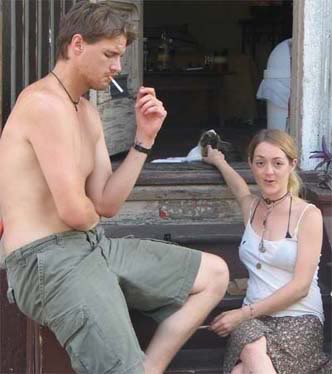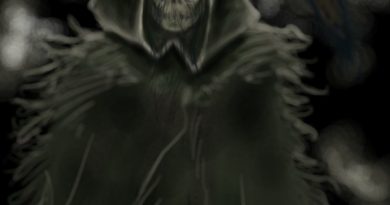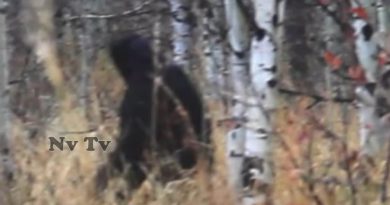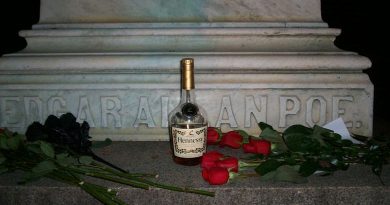The Zach Bowen and Addie Hall Voodoo Murder/Suicide – Unexplained Mysteries
On October 17, 2006, New Orleans police respond to a 9-1-1 call from the Omni Hotel – someone has fallen to their death. They arrive to find a young man’s body with a note that says: “This is not an accident. I had to take my own life to pay for the one I took.” A year earlier, in the French Quarter, Addie Hall, a free-spirited dance teacher, met Zack Bowen, a talented musician/bartender who had served with the Army in wars in Kosovo and Iraq. The two fell in love just weeks before Hurricane Katrina. The two chose to remain in the city, thinking they would survive the oncoming storm, but they could not survive their own troubled pasts. Zack’s suicide note directs the police to an address in the French Quarter, where they find Addie’s dismembered body. Zach had strangled her to death nearly two weeks earlier. On the walls near her body, he had spray-painted pleas for help with his pain and his “total failure”.
In late October of 2006, police responded to a call from the Omni Hotel in New Orleans regarding a jumper. A man had apparently leapt off the roof of the building and landed five stories down on the hotel’s parking garage roof. When the police got there, it was clear that the man died on impact. It seemed, at first, that this was not a job for homicide. What did they have to do with a man who took his own life? The answer was in the deceased’s front pocket in the form of a several page long suicide note. In it were instructions on how to find pieces of his girlfriend.
Zack Bowen was, according to those who knew him, a decent person There was nothing about him that made people guarded or nervous. He was neither extraordinarily attractive nor memorably unattractive. He was not mean. He was not the homecoming king. He was just a pretty average American boy. He had plenty of friends, was sociable and clearly hid whatever was welling beneath the surface in the last few years of his life.
When Zack was 18 years old, he met a 28-year-old stripper named Lana Shupack. The two married and, according to some sources, Zack joined the military in order to support her and the two children their marriage bore. He rose to the rank of Sergeant in the U.S. Army over the course of a tour in Kosovo and a tour in Iraq. Some of his time in Iraq was spent at Abu Ghraib. At least one of his friends told Bowen’s biographer that he seemed to change while overseas. He was less happy and wanted to come home.
Zachary Bowen was a war hero. While serving as a military policeman in Kosovo and Iraq, he earned numerous awards for his bravery. Bowen had moved to New Orleans in the mid-ninties, leaving only to go to Iraq and returning after completing his tour of duty. During the turbulent winds of Hurricane Katrina he met and fell in love with Addie Hall. Hall offered Bowen shelter in her apartment on Gov. Nicholls Street. While the two knew each other before Katrina, the exact details of their relationship are vague.
After Katrina, the two became inseparable. They gained local notoriety for refusing to leave the Quarter after the storm, choosing instead to stand by New Orleans.
Aside from his military honors, no one knew much about Bowen’s past. He had indicated to some that he had been married at one time and had two children. He worked in a local grocery store doing deliveries and bartending part-time.
Zack Bowen got his wish to come home via a general discharge. Because of the less than honorable conditions of his departure from the Army, despite an alleged honorable recommendation from his commanding officer, Bowen was left bitter. Still, he managed to keep enough of a smile on to become a bartender in the French Quarter of New Orleans after he came home. He and his wife separated not long after his return, leaving Zack single in a city full of eligible women.
Bowen eventually set his sights on another bartender. Her name was Addie Hall. The two had one important thing in common, they both liked to drink — a lot. When Hurricane Katrina hit, the two holed up in their apartment together and rode out the storm. They were two of very few people who did not evacuate. This gained them media attention in the wake of the storm, partly because Addie had a habit of baring her breasts at police officers when they drove by. The two were also known to make cocktails for visitors to the damaged neighborhood.
The aftermath of Hurricane Katrina was like a camping trip to the young couple. They lived without electricity, drank what they had, traded booze for water and lived a life without responsibility beyond survival. Many would later say that it suited them and going back to real life had been the tragedy for the pair. Hall was known for being a mean drunk and abusing her boyfriend when she was in the mood. Once things started getting back to normal in the French Quarter, she reportedly told their landlord that Bowen was cheating, so she was going to kick him out. It is hard to tell if these accusations were based on drunken delusion or reality.
It could be said that Zack Bowen and Addie Hall had an unsustainable lifestyle. On the one hand, there is a bartender (perhaps also a stripper, according to some sources) who drinks too much and may be too free with her fists. On the other hand, there is a damaged man who also drinks too much, has been across the world to fight only to come back to a small corner of the world and fight again, in more ways than one. Add to that the fact that their friend “Squirrel” was allegedly supplying them with a steady stream of cocaine and disaster couldn’t be more obvious. What was shocking was how it all came crashing down.
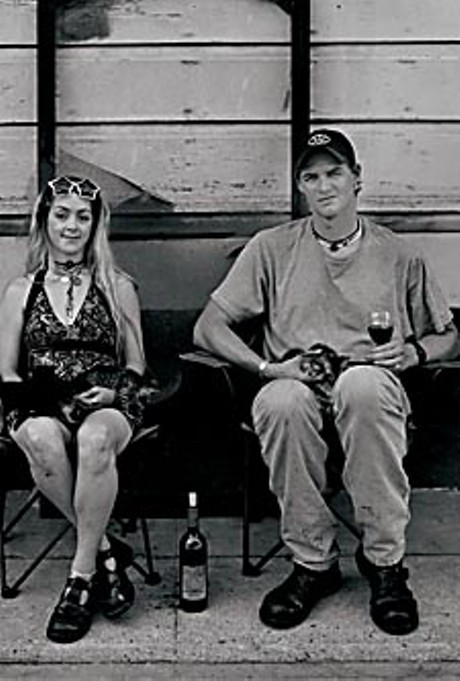
What Zack did next was cook what he managed to get on and in the oven. He reportedly said that he was trying to “separate the meat from the bone.” It is likely that this was an attempt to get rid of the evidence. There is nothing to suggest that the man was trying to consume Addie Hall’s remains. What he did cook was so charred as to be unrecognizable. While the police knew who the victim was before they even entered the home more than a week later, it took some time to i.d. her because of the condition of her remains. Some sources also state that Bowen had sex with her corpse. Police adamantly denied this claim.
After the murder, Zack Bowen spent some time in the apartment, writing messages on the wall in spray paint and penning the five-page note that would eventually be found with his body. When he wasn’t there, he was out drinking, getting strippers and doing drugs with his friends. All of this was evidently in an effort to numb the shock of what he had done, as evidenced by what he wrote and eventually did.
The letter in Zack Bowen’s front pocket at the time of his death told police where he lived, where they would find Addie and why. His keys were also in his pocket, as was the name of his landlord, who would eventually let the police into the apartment. On the walls of the apartment, in spray paint, they found these messages: “please call my wife. i love her. i’m a total failure. look in the oven. please help me stop the pain.” There were also burns on his body that left a message. He stated that he burned himself with a cigarette for every year of his life as punishment for his failures.
There are those from the French Quarter and elsewhere who think this was more than just the story of tumultuous love, drugs, alcohol and murder. There are those who believe Zack Bowen may have been influenced by a demonic presence emanating up from the voodoo shop above which the pair made their home. Whether this theory holds any water is a matter of opinion. However, the owner of the Voodoo Spiritual Temple is well known and respected in the French Quarter. Whether or not that has any bearing on her hosting a demon in her shop is another matter of opinion.
Another possible explanation for this bizarre crime is that Zack’s experiences just caught up to him. Perhaps he had some lingering issues from his two tours overseas. Maybe Addie really was as abusive as they say. Maybe all of this added up to him feeling so much like a failure that, after he snapped and killed his girlfriend, he first tried to hide the evidence and then took his own life.
Whatever the reason Zack Bowen killed Addie Hall, he was clearly one of the few killers who went to enough trouble to cook their victims and later felt true remorse. The Albert Fishes and Jeffrey Dahmers of this world do not typically feel bad. Of course, they also ate what they cooked. That Bowen killed himself and the clear confusion he felt in the aftermath is evidence enough that even he was disgusted by what he had done. Do demons, whether war-related or truly from hell, excuse such a ghastly crime? Of course not. Even Zack Bowen knew that. Is it possible that his own suffering made victims out of both him and Addie Hall? Almost definitely.
Zackery Bowen walked up to the ledge, looked over, then turned around and walked away.
A surveillance camera trained on the eighth floor at the poolside bar at the Omni Royal Orleans Hotel caught Bowen, 28, repeating the action, over and over, apparently hesitating as he prepared for one final, horrific act.
His descent into darkness began more than two weeks ago, police and associates said, when he murdered his girlfriend, 30-year-old Adriane “Addie” Hall, strangling her in their one-bedroom apartment over a French Quarter voodoo shop. Bowen killed his girlfriend of more than a year without a tinge of remorse, according to a suicide note he carried in his right front pocket, in a plastic bag, for police to find on his body.
Bowen left a second, rambling letter in the couple’s apartment, a graphic narrative of the murder and desecration of Hall’s body, scrawled on eight small pages of his girlfriend’s journal. That letter, along with interviews with police investigators and the couple’s friends and co-workers in the French Quarter and Faubourg Marigny, tell a sordid tale of extreme highs and lows, starting with a Katrina-inspired love affair and ending in one of the most gruesome slayings in the city’s history.
In the letter, Bowen confessed that for almost two weeks after the killing he lived with the corpse of the woman who had repeatedly proclaimed her love for him. In those final days, driven by an accelerating madness, underpinned by unrelenting fury and self-loathing, he dismembered her corpse — baking her limbs in the oven and cooking her head in a pot on the stove, police said — until he decided to end his own life.
Bowen had planned every detail before heading to the hotel bar Tuesday night, except, perhaps, for the hesitation he faced on the ledge. The hotel security tape, described in an interview with police sources, shows him struggling to muscle up the courage.
Up to the railing, then back. Up again, then back.
Just before 8:30 p.m., he leaped to his death, landing on the roof of the hotel parking garage below.
“I just find it so hard to believe,” said Caryn Lott, owner of Buffa’s, the French Quarter outpost where Bowen had tended bar. “I’d be willing to bet it was something in his past, something that was underneath. I just don’t think we looked far enough.”
Cigarette burns
Much of Bowen’s past remains a mystery, known only through the painful details he leaked to his friends in New Orleans. He ends the letter found in the apartment with a list of his “failures — school, jobs, military, marriage, parenthood, morals, love.”
“Every last one of these I failed at,” he wrote. “Hence the 28 cigarette burns” — 13 on each arm and two on his chest — “one for each year of my existence.”
Friends said he grew up in Los Angeles, but the details that drove him to inflict those burns into his flesh are few.
Bowen once had been married and had two children, a girl and a boy, said Louis Matassa, who later hired Bowen to make deliveries for his French Quarter grocery.
Lott recalled how Bowen said he had served in the military. Efforts to confirm his military service were unsuccessful Wednesday.
Though typically gregarious, Bowen’s demeanor took a dive when he talked about that part of his life, often after several rounds of Miller High Life and shots of Jameson Irish whiskey, his drinks of choice. He would grow angry and distraught, Lott said, talking of how the government “messed him over,” referring to his military service, which he told friends included stints in Iraq and Bosnia.
While he sometimes spoke of that service with pride, somewhere overseas there had been an incident concerning a child that weighed heavy on him, said Donovan Calabaza, another bartender at Buffa’s, “but we really didn’t get into it.”
Lott didn’t like it when he talked about the military.
“How ’bout them Saints?” Lott would say, trying to move him onto a lighter topic.
‘She really loved him’
Hall’s life carried its own burdens. Friends said she grew up in Pennsylvania, though they had few other details of her past. Calabaza said he and Hall occasionally shared details about their similar childhood traumas.
Hall and Bowen fell in love the night Hurricane Katrina struck, said former mayoral candidate Leo Watermeier, who would later rent them their last apartment on North Rampart Street, relaying the story they told him.
Blond and petite, Hall harbored an intense attraction to Bowen, a tall, strapping man with a magnetic personality. Lott said she hired him at Buffa’s as “a little eye candy for the ladies.” Hall and Bowen would visit each other at the bars where they worked — she going to Buffa’s, he stopping by The Spotted Cat in the Faubourg Marigny.
Sometimes he took advantage of his looks at her expense, associates who knew the couple said, flirting or even making out with other women. Their relationship veered between highs and lows, but “she loved that guy,” said Eura Jones, who worked with Hall at The Spotted Cat. “She really loved him.”
When the blaring music at Buffa’s drowned out their conversation, they wrote love notes to each other, Calabaza said.
Sticking it out
In the weeks after the storm, they became French Quarter icons, some of the last holdouts who resisted calls from the mayor and the military to leave the city. They peacefully resisted, inventing a new brand of post-disaster bohemianism.
They became inventors by necessity, fashioning a fly swatter from a pair of plastic plates taped onto a wire hanger. He fashioned a stove of sorts out of a metal bucket packed with felled branches and covered with an old barbecue grill.
In the afternoons, they sat on the stoop of their powerless Gov. Nicholls Street apartment, getting their news from neighbors and passers-by, often offering them cocktails. Bowen usually went shirtless in those humid weeks after the storm. Hall wore a tank top, lovingly stroking stray cats that sauntered up to where she and Bowen sat, sharing cigarettes.
“It’s actually been kind of nice,” Bowen said in those first weeks after the storm. “And I’m getting healthier, eating right and toning up.”
“We’ve been able to see the stars for the first time,” Hall said. “Before, this was a 24-hour lit city. Now it’s peaceful.”
Both working as bartenders at the time, Hall and Bowen were flush with alcohol and beer, sometimes trading it for water and ice when they couldn’t get enough from the Salvation Army. They got a three months supply of food, mostly canned, when a local grocer opened his doors and invited people to peacefully take what they want, rather than face the destruction caused by looters.
Hall devised a provocative way to lure police protection to their neighborhood. The New York Times described her habit of flashing her breasts at passing police cars to make sure their house got routine patrols.
‘A revolving door’
But as the year wore on and life began to stabilize in New Orleans, their relationship began to fall apart.
Several months ago, Hall, distraught by a brief breakup with Bowen, failed to show up for work. He also disappeared from his jobs at Buffa’s and making deliveries for Matassa’s. They would reunite, but only for a time, friends said, before his downward spiral into madness took hold.
“It was a revolving door,” said Lisa Perilloux, a regular at Buffa’s.
One night, Hall was seen screaming at him from Buffa’s doorway as he stood in the street, Perilloux said. “He was getting rid of her,” Perilloux said, who said she never heard Bowen say anything nice about Hall.
While Bowen struggled with his demons, Hall had her own moments of instability. Friends describe her as having a frightening mean streak. She was arrested Aug. 14 after pulling a gun on a man at a French Quarter corner early in the morning. According to the police report, Hall pointed a blue steel handgun at the man and said, “What the f – – – is wrong with you?”
As the man called the police, Hall ran to her apartment on Gov. Nicholls, where officers found her changed out of blue jeans and T-shirt and into a nightgown. At the apartment, officers found the gun, along with a bag of what police believed to be marijuana and two pipes. The man identified Hall as the woman who pulled a gun on him, according to the police reports.
Hall was booked with aggravated assault with a firearm, first offense possession of marijuana and possession of drug paraphernalia.
The morning of Sept. 28, police again arrived at the Gov. Nicholls apartment, responding to a call about a disturbance, according to a police report. They found Bowen on the stoop. When he spotted the officers, Bowen got up and dropped an object that turned out to be a clear plastic bag of marijuana, according to the police report. He was booked with first offense possession of marijuana.
Beginning of the end
Even as they were falling apart as a couple, Jones said they faced more stress when they were evicted from the Gov. Nicholls apartment around the time of Bowen’s arrest. Hall disappeared permanently from her job at The Spotted Cat around that time.
“I had a feeling something was seriously wrong,” said Ed Parrish, The Spotted Cat’s co-owner.
Around Oct. 1, they rented an apartment from Watermeier at 826 N. Rampart St., above the Voodoo Spiritual Temple and Cultural Center.
But a few days later, they were fighting again, this time over which of their names would appear on the lease. Hall told Watermeier she was going to kick Bowen out. He had been cheating on her, Watermeier said, and she had had enough.
No one ever saw her again.
On Oct. 6, the day after Bowen said he killed Hall, he wrote in his confession that he was “posed with the question of how to dispose of the corpse.”
He wrote that he passed out after drinking, then went to work at Matassa’s, all day long devising a plan that involved cooking her body.
It was during the days of methodically dismembering her body that Bowen said he decided to kill himself after one final blowout — “spend the $1,500 I had being happy until I killed myself. So that’s what I did: good food, good drugs, good strippers, good friends and any loose ends I may have had. And had a fantastic time living out my days.”
Voodoo Priestess Miriam Chamani, who runs the center, said she last saw Bowen on Saturday morning as he was walking into the apartment.
On Sunday, Bowen appeared “all jolly,” Perilloux said, as he quaffed beer and shot Irish whiskey at Buffa’s.
“He was (in) a great mood, best mood I’ve ever seen him in,” she said.
Calabaza quoted him saying he would take a “much-needed vacation” — to Cozumel or some other island resort.
Two nights before Bowen leapt to his death, Calabaza recalled telling Bowen:
“Just think, tomorrow night, you’ll be in paradise.”
